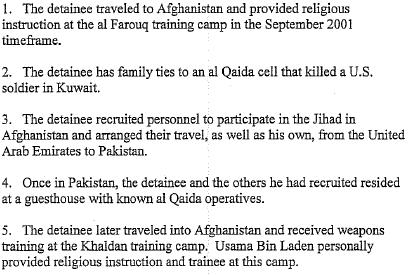Michael Reagan, on his radio show Friday, interviewed Debra Burlingame, the author of Gitmo’s Guerrilla Lawyers, who described how the lawyers for the “Kuwaiti 12” created new profiles for their clients. In addition, she spoke of the media’s laziness in investigating the PR claims and how they often collaborated in the effort:
“They made millions of dollars, Sherman and Sterling, and tried to hide it by saying the families of these detainees hired them. In truth, the Kuwaiti government hired them. Another thing they said they were going to give all their fees to a 9/11 charity… the worst thing is they knew they could not sell letting these people go and sending them home if the American people knew these were the hardcore bomb builders, weapons trainers, financiers for al Qaeda, recruiters for al Qaeda. They knew that the American people wouldn’t go for that so they hired a PR firm to reinvent and create new profiles for them…
…
“Color the facts? Its lying and here is why it is lying…” Click here and listen to the entire interview.
While eight of the new and improved “Kuwaiti 12” have been released, four are still detained at Guantanamo. Let’s look at their reinventions and compare them to what their Combatant Status Review Tribunals discovered about them:
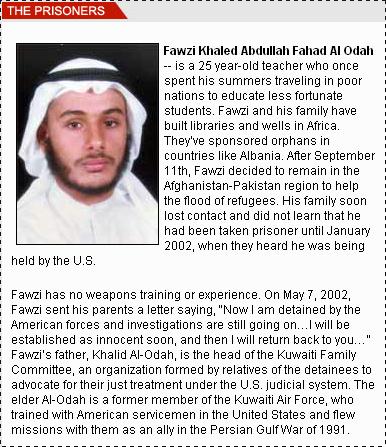
Excerpt from al Odah’s CSRT:
The Tribunal initially commensed on 28 August 2004. The unclassified evidence presented to the Tribunal by the Recorder in the form of the Summary of Evidence for Combatant Status Review Tribunal (Exhibit R-1) indicated: The detainee is associated with Al Qaida and Taliban; in August or early September 2001, the detainee admitted to traveling through Afghanistan with Taliban members; the detainee admitted to firing an AK-47 at a training camp near Kandahar [Afghanistan]; the detainee admitted to staying at a guesthouse with fighters armed with AK-47 rifles; the detainee engaged in hostilities against the U.S. or its coalition partners; the detainee admitted to carrying an AK-47 through the Tora Bora mountains for ten (10) to eleven (11) days during the U.S. air campaign in that region; and the detainee was captured with five (5) other men by Pakistani border guards.
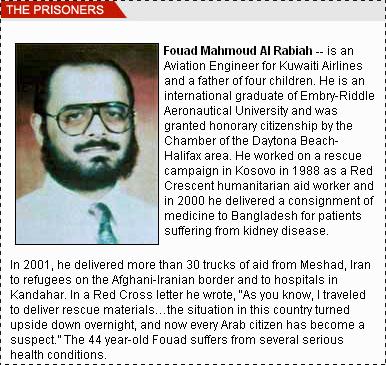
Excerpt from Rabiah’s CSRT:
You may be concerned because I did happen to see Usama Bin Ladin (UBL) when I traveled to Kandhar in June 2001 to investigate the refugee problems in Afghanistan. I never saw UBL before or after that, I did not travel to see him, I did not expect to see him, and I never spoke with him. After I finished my meetings on the refugee problems, I accompanied the young scholar with whom I was traveling “Abu Almonther” who wanted to talk with Bin Ladin. You must remember that at the time UBL was not the famous terrorist that he is now. I had heard of him basically as a Saudi billionaire who lived as a monk. While there had been some rumors that he had been involved with bad actions, my understanding was that he had denied them. And that he was most famous for fighting the Russians. I accompanied Abu Almonther who went to dinner and to speak with Bin Ladin. The dinner invitation was in his house in the town Kandhar there were no guards or guns anywhere. The invitation lasted two hours. For the next 2 days we were also invited to lunches and dinners by many other people in town also invited many other people including UBL.
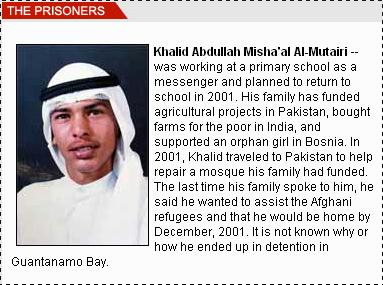
Excerpts from Khalid Abudullah Mishaal Al Mutairi’s CSRT:
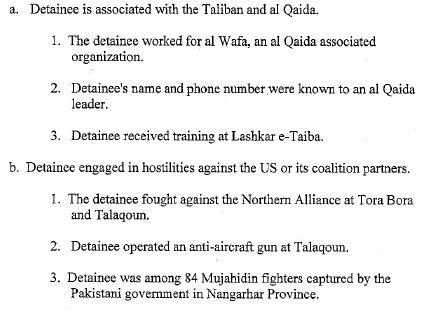
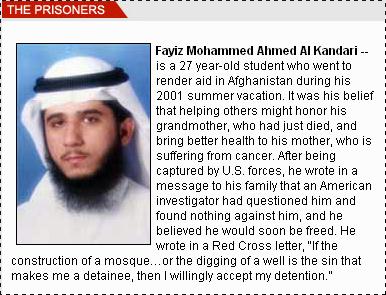
Two excerpts from Al Kandari’s CSRT:
